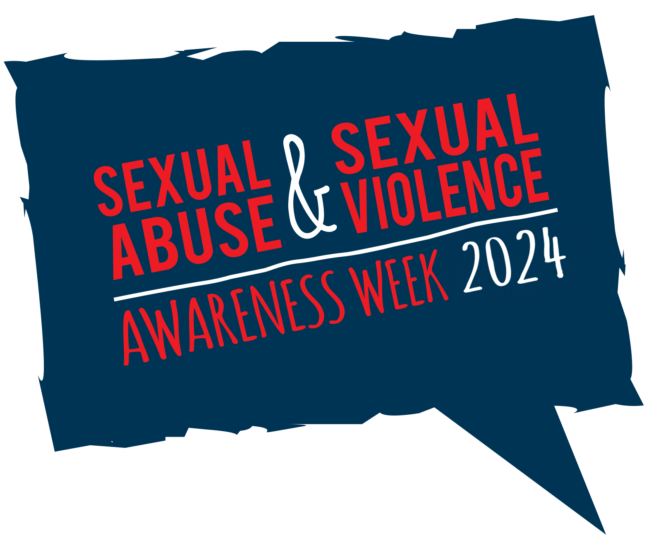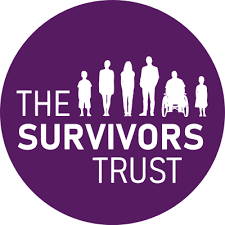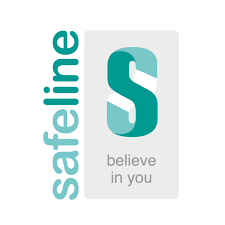The Sexual Abuse & Sexual Violence Awareness Week occurs on the first full week of February. For 2023 that will take place from 5th to 11th February
During the Awareness Week, hundreds of events take place, both online and in person, all over the country to raise awareness of sexual abuse & violence.
If you are holding an event, you can contact info@sexualabuseandsexualviolenceawarenessweek.org and they will promote your event on their social media platforms.

If you are worried that a young person and/or an adult are experiencing sexual abuse and/or sexual violence, there are services that can help. If you google help after sexual abuse or assault there are a lot of options to explore, we have included a few below:
1. Sexual Assault Referral Centres (SARCs)

They offer medical, practical, and emotional support 24/7 to anyone who has been raped, sexually assaulted or abused.
SARCs are located across the country and are here for everyone, regardless of when an incident happened. They are staffed by health and wellbeing professionals, who can provide support to individuals and arrange counselling and therapy sessions following rape, sexual assault or abuse.
You can self-refer and, unless there is a safety issue, it’s up to you whether to involve the police or not. Click this link to find a centre in your area.
2. The Survivors Trust

Who are the largest umbrella agency for specialist rape and sexual abuse services in the UK and has been providing infrastructure support to their members for the past 20 years.
They have 120 member agencies based in the UK and Ireland providing information, advice, support and therapy, and their services work with victims and survivors of all ages, all genders, of all forms of sexual violence, sexual abuse and sexual exploitation, including support for partners and family members. To access them follow click on the button.
3. Safeline

They help prevent sexual violence and support anyone who has been affected. They can be contacted by calling 01926 402 498 or by visiting their website. Click on the button.
If you are a practitioner who is worried about a child and/or adult you are working with then you will need to take action.
Always follow your organisations policies and procedures, but below is some additional information that may help.
If you are worried about a child but you do not have consent to make a referral to Social Care:
In most cases it is appropriate to seek consent. However, there are still some cases where it is not.
Consent should not be sought if doing so would:
• Place a person (an individual, a family member, worker or a third party) at increased risk of significant harm to the child.
• Prejudice the prevention, detection or prosecution of a serious crime - this is likely to cover most criminal offences relating to children.
• Lead to an unjustified delay in making enquiries about allegations of significant harm to a child.
If you are worried about an adult (who has additional care and support needs) but you do not have consent to make a referral to Social Care:
Sharing the right information, at the right time, with the right people, is fundamental to good practice in safeguarding adults but has been highlighted as a difficult area of practice.
Adults have a general right to independence, choice and self-determination including control over information about themselves.
If a person refuses intervention to support them with a safeguarding concern, or requests that information about them is not shared with other safeguarding partners, their wishes should be respected.
However, in the context of adult safeguarding these rights can be overridden in certain circumstances.
• The person lacks the mental capacity to make that decision. This must be properly explored and recorded in line with the Mental Capacity Act.
• Other people are, or may be at risk, including children.
• Sharing the information could prevent a crime.
• The alleged abuser has care and support needs and may also be at risk.
• A serious crime has been committed.
• Colleagues are implicated.
• The person has the mental capacity to make that decision but they may be under duress or being coerced.
• A court order or other legal authority has requested the information.
If you are worried about an adult (who DOES NOT have additional care and support needs)
If the adult does NOT have additional care and support needs, then a referral to Social Care would not be accepted.
In this instance you would:
Listen
One of the most important things you can do for someone who was abused or is being abused is to listen without judgment. Acknowledge their feelings and experiences.
Let them share their story at their own pace and avoid interrupting or minimising. Validate their emotions and experiences and let them know it was not their fault.
Accept their version at face value and refrain from suggesting how they could have handled or could handle the situation differently or better.
Connect Them With Resources
Numerous resources are available, including therapy and support groups.
Encourage, and offer to help to seek out these resources. You can also direct them towards hotlines and websites that offer resources and support, such as the services listed in this article.
Respect Their Boundaries and Decisions
It’s crucial to respect the persons boundaries and decisions. It’s important to be patient and understanding, while offering support and encouragement.
Whatever a survivor chooses to do with their story is their decision. Respecting this autonomy will empower them on their healing journey.
Take Care of Yourself
Supporting someone who has experienced abuse can be emotionally taxing. It’s also important to take care of yourself and seek support from others.
Supporting survivors of abuse can be challenging, but it’s a critical part of their healing journey. It requires patience, understanding, empathy, and a non-judgmental attitude. Your support can be incredibly beneficial for their recovery.
More on this can be found at: https://endcan.org/
My passion is for learning, any age, anywhere, anytime. That is why I offer Interactive E-learning, Face to Face training, Microsoft Teams/Zoom training and consultancy services. Learning should be easy to organise, and more importantly fun!
The world is moving so fast these days, especially where technology is concerned, everything is mobile, what would we do without our mobile phones and tablets? Learning takes place every day, whether it’s from an article we read, an app we download or a conversation we have going about our everyday lives. We are always learning and developing.
Author: Maxine Clark
Visit Maxine on LinkedIn
